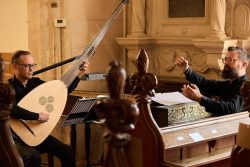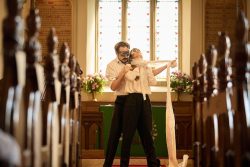 THERE is something special about the sound of a period musical ensemble in an old church – the voices and the instruments seem to take on a special feel, and even if the acoustic is not perfect, the effect is always emotional and compelling.
THERE is something special about the sound of a period musical ensemble in an old church – the voices and the instruments seem to take on a special feel, and even if the acoustic is not perfect, the effect is always emotional and compelling.
And so it was at the beautiful little St Mary’s Church at Wingfield, where this year’s IF Opera festival finished its summer season with a delightful double bill of short baroque operas.
The sun shone all afternoon – although thankfully temperatures were a little lower than earlier in the week when audiences baked in the marquee for the main programme of Rigoletto and Orpheus in the Underworld. That sunny backdrop was a quiet contrast with the tempestuous themes of the two works – Carissimi’s Historia Jonae and Monteverdi’s Il Combattimento di Tancredi e Clorinda, works in which both the elements and human temper are violently torn and tossed.
 The programme’s sub-title was “Whales, Warriors and Love Lost” – reflecting the familiar Old Testament story of the prophet Jonah, who is thrown off a ship and swallowed by a whale, and the First Crusade drama of the Christian knight Tancredi who engages in single combat with an unknown Saracen, revealed at the point of death to be the famed woman warrior Clorinda, whom he loves. Based on Tasso’s epic poem, Gerusalemme Liberata, the opera ends with Clorinda asking Tancredi to baptise her and she dies in peace.
The programme’s sub-title was “Whales, Warriors and Love Lost” – reflecting the familiar Old Testament story of the prophet Jonah, who is thrown off a ship and swallowed by a whale, and the First Crusade drama of the Christian knight Tancredi who engages in single combat with an unknown Saracen, revealed at the point of death to be the famed woman warrior Clorinda, whom he loves. Based on Tasso’s epic poem, Gerusalemme Liberata, the opera ends with Clorinda asking Tancredi to baptise her and she dies in peace.
Both works call for vocal and musical storms and the singers – working both as soloists and as chorus in the Carissimi – were supported by the Zarek Trio and Friends, who provided a brilliantly passionate and percussive background for the vocal fireworks.
 Joseph Doody, IF Opera’s Orpheus earlier in the week, ably took on both the tormented role of Jonah, punished by a vengeful God for his unwillingness to preach to the sinful city of Nineveh, and the narrator – and largest role – in the Monteverdi. Singing from the pulpit of the 700-year old church, he describes the meeting of the two knights, the chivalrous decision of the mounted Tancredi to fight his Saracen opponent on foot, and the ferocious sword battle in which both are bloodied – and Clorinda eventually killed. Baritone Kieran Rayner and lyric soprano Lucy Knight had to do a lot of very dramatic acting and movement, but relatively little actual singing in this extraordinary and exciting work.
Joseph Doody, IF Opera’s Orpheus earlier in the week, ably took on both the tormented role of Jonah, punished by a vengeful God for his unwillingness to preach to the sinful city of Nineveh, and the narrator – and largest role – in the Monteverdi. Singing from the pulpit of the 700-year old church, he describes the meeting of the two knights, the chivalrous decision of the mounted Tancredi to fight his Saracen opponent on foot, and the ferocious sword battle in which both are bloodied – and Clorinda eventually killed. Baritone Kieran Rayner and lyric soprano Lucy Knight had to do a lot of very dramatic acting and movement, but relatively little actual singing in this extraordinary and exciting work.
Both works were directed by Monica Nicolaides, and the period instrument ensemble was directed by Oliver John Ruthven.
Photographs: Adam Gault Photography for If Opera